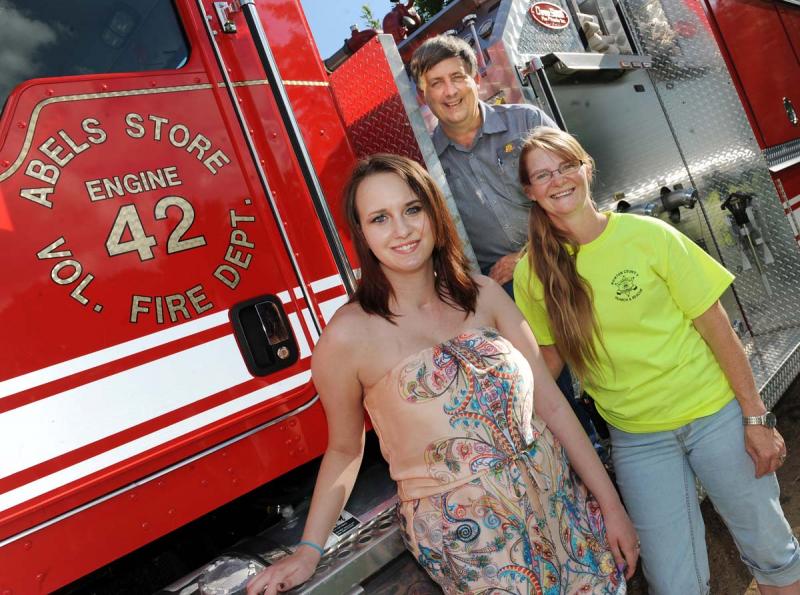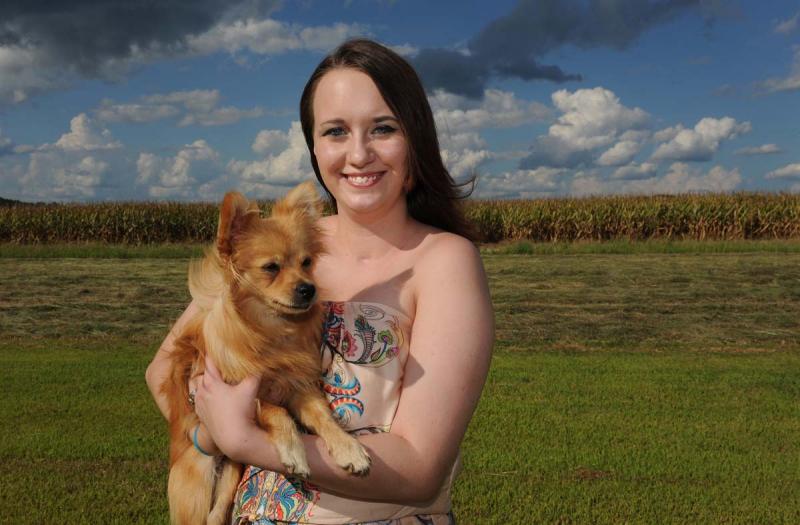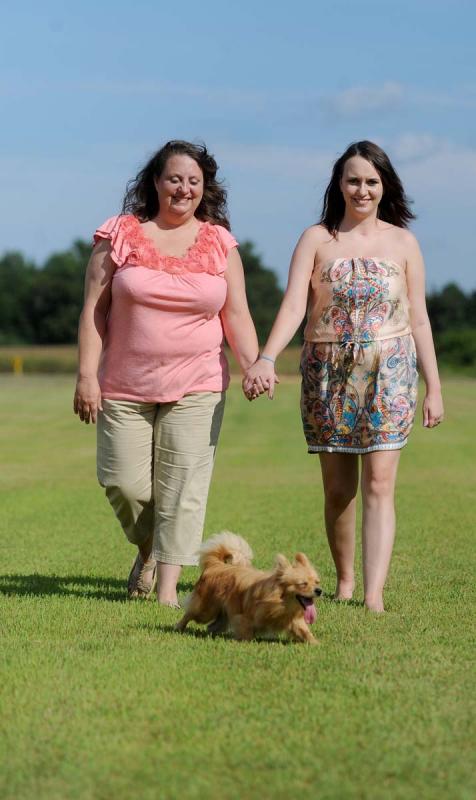“Hey, what are you doing?”
If Robyn Thomas had answered that text, the reply might have been: Fighting for my life.
On May 21, 2012, the Snow Lake teen was found trapped in her silver Ford Fusion, the victim of a brain-damaging crash.
“We believe she looked down at her phone and hit a tree going 60 miles per hour,” said her mother, Kim.
Robyn can’t recall being pried from the wreckage with the Jaws of Life. Or the helicopter whisking her to The Med in Memphis. Or her parents’ despair when they learned their 19-year-old daughter might not survive the night.
But she can’t forget all she lost during a moment of distraction.“I miss college a bunch,” said the former scholarship student at Northwest Community College in Senatobia.
Today, 20-year-old Robyn speaks out about the dangers of distracted driving. And it’s a poignant message coming from someone who spent months unable to speak at all.
“Even when she was in pain, she did not yell out,” remembers Lauren Pierce, Robyn’s speech-language pathologist during her 45 days at Methodist Rehabilitation Center in Jackson. “It took her two weeks and 10 to 15 hours of therapy with me before she even mouthed a word.”
Robyn had only recently emerged from an almost two-month coma when she began therapy at MRC on July 3, 2012. She arrived slumped in a wheelchair, her chin resting on her chest.
“Her head control was so poor that we considered putting her in a cervical collar,” said occupational therapist Chuck Crenshaw. “She didn’t have any trunk control or balance. We put her in a wheelchair that tilts backwards to keep her centered in the chair and upright.”
“She was just a limp little rag doll,” Pierce said. “But I knew she was in there.”
To improve Robyn’s awareness, Dr. Zoraya Parrilla tried a variety of time-tested strategies, starting with fine-tuning her medications.
“You eliminate medications that are sedating or that might negatively impact cognition or motor recovery, then you try medications to enhance cognition and wakefulness,” explained the rehab medicine physician that leads MRC’s brain injury team. “All our team members got involved to come up with ways to get her to engage.”
The first step forward came the day Dr. Parrilla handed Robyn a pen and paper. “She asked Robyn to write her name and she wrote, ‘Robyn Thomas,’” Kim said. “I have that framed on the wall. She also asked her how she felt, and she wrote two full sentences.”
Encouraged by the exchange, the brain injury staff began an all-out assault to get Robyn to talk.
“They were promising her anything to speak,” Kim said. “And she said Pepper (as in the drink Dr Pepper) and they got her one.”
But Pierce said it was a wildly popular Carly Rae Jepsen tune that sparked a conversational breakthrough. “I sang: ‘Hey, I just met you, and this is crazy. But here’s my number,’ and Robyn whispered: ‘So call me maybe.’ Her mom started crying, and she was a puddle. And Robyn put on a show. We sang the entire song in the hall.”
Kim’s outburst was understandable, given all the Thomases had been through. Until they got to Methodist Rehab, the family was given little hope that Robyn could recover.
Her brain had ricocheted inside her hard skull, causing such widespread bruising and bleeding that doctors compared it to the often fatal shaken baby syndrome.
“Her neurosurgeon told us she would never wake up and would have to be in a nursing home,” Kim said.
Mollie Kinard of Holly Springs, a former critical care nurse turned outreach rep for MRC, wasn’t surprised that ICU staff doubted Robyn’s potential.
“When you’re an ICU nurse, you work very closely with doctors and are one-on-one with patients 24 hours a day. And when you see a patient make little to no progress and the doctors say the prognosis is grim, you expect a poor recovery. I’ve been guilty of it myself,” Kinard said.
“But working at Methodist Rehab totally changed my perspective. I didn’t know what specialized rehab did for people.”
Neither did Kim. But after some research, she was convinced MRC could help her daughter. And she was determined to get Robyn transferred to the hospital’s nationally recognized brain injury program.
“I had to fight tooth and nail,” she said, because doctors had deemed Robyn “unresponsive.”
“I got a Spider-man squeeze ball in the gift shop and for hours I would say: Robyn, squeeze the ball. When she did, I would videotape it. Then I said: ‘Let me show you what she can do.’”
The video convinced one doctor to give Robyn a chance at rehab, and Kinard remembers getting the referral call. “They told me we were her last hope,” Kinard said. “Nobody could take her because she was so low level.
“When I first saw her, she couldn’t do anything but roll side to side on the bed. I wouldn’t have thought she would ever talk or walk. Then three or four weeks later, I went into her room at Methodist, and she said: ‘Hey and thank you.’ It blew me away.”
Robyn’s young age was “a big driving factor” in her astonishing recovery, Parrilla said. But she also benefited from strong family and community support and a number of specialized therapies available at MRC.
Staff used the Dynavision 2000 Light Training Board, an electronic device that employs game-like exercises, to address Robyn’s vision and attention problems. And sessions on the hospital’s weight-supported treadmill system helped improve her walking ability, as evidenced by her frequent jaunts around the hospital with her mom in tow.
“They used to keep track of the number of laps they did in the hallway and it was in the thousands,” Crenshaw said. “I told her mom if she only weighed 20 pounds when she came back, we would know why.”
Once she got home, Robyn also managed a trot around the bases following one of her sister’s softball games. “People said the whole stadium stood up and started clapping and there wasn’t a dry eye in the house,” Kinard said.
MRC therapists also were touched by the rejuvenated Robyn, and Pierce admits: “After she left, we talked about her at lunch all the time. We all fell in love with her, and she really impacted us. She gave me hope as a therapist to see how severe she was and how well she is doing now.”
The Thomases are similarly emotional about Methodist Rehab staff. “I love them,” said a teary-eyed Kim. “The Med may have saved Robyn’s life, but Methodist Rehab gave her quality of life.”
“If anybody asks me, I’m like: Go there,” adds Robyn.
Robyn is continuing therapy at a clinic close to home and has a long list of goals. “I want to get my license back and prove to my mom I can do anything by myself,” she said.
On the weekend before July 4, Robyn achieved a milestone her mother had been longing for since the day her daughter lapsed into a coma. During a community celebration, Robyn got the giggles.
“She had not laughed or cried since the accident,” Kim said.
Like many brain injury survivors, Robyn had trouble expressing emotion. But it hasn’t kept her from taking a passionate stand against texting while driving. “I say: Put your cell phone on silent and throw it in the back,” she said.
While Robyn’s parents are proud of her efforts, it hurt to face the likely cause of her accident. “It took a long time for my husband and I to come to grips with the knowledge our daughter had made a mistake,” Kim said.
But by the one-year anniversary of her accident, the family was ready to let Robyn’s tragedy become a cautionary tale. “We were contacted by a TV producer to do a story on her,” Kim said. “We agreed if it could help someone else, it’s worth it.”
For more information on Methodist Rehab’s Brain Injury Program, please call 601-364-3336.



